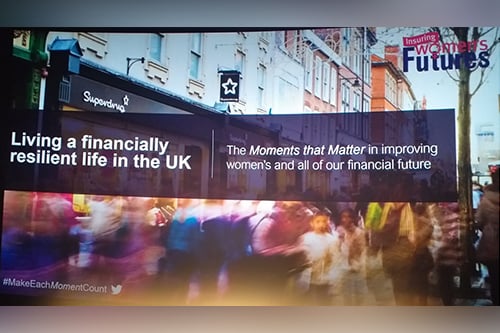

The Insuring Women’s Futures (IWF) initiative led by the Chartered Insurance Institute (in collaboration with a wide range of leading professionals, organisations and experts) is more than a programme, it is also a pledge. The pledge has been taken up by insurers, professional bodies, guidance services and financial advisors who have promised to take action to empower women to improve their financial futures.
At the recent Manifesto Proposals launch event of this initiative, a number of proposals for how to enact real change to help women in the UK live a financially resilient life were detailed. Central to these recommendations was the need to lobby government for changes to auto-enrolment, pension freedoms and sharing rules to safeguard the financial future of female pensioners.
Another key necessity was the requirement for insurers to offer flexible working and inclusive practices to their employees. Beazley, London Market Group, Scottish Widows, Swiss Re, AXA, Vitality, Zurich and AIG have all signed this flexible working pledge and committed to analysing and changing (where necessary) their practices in this area.
IWF manifesto steering committee chair and lead author, Jane Portas outlined the imperative of finding the “moments that matter” in the female financial life journey, to help create proposals on how to improve the financial resilience of women.
“We sought to identify where are those moments,” she said, “where is the greatest need to improve women’s financial resilience and also the greatest opportunity?”
This led to the development of eight key personas, to reflect the experience of women across our society, outlined Portas, who said: “I can’t guarantee that they will reflect every single woman, but they are typical in the challenges and risks and the financial resilience issues that women in our society face today.”
These personas reflect not just the present state of society but also the challenges afforded by the future where, as outlined in the IWF manifesto, by 2050 the average age will be nine years older than today. A world where it is predicted that 85% of the jobs that will exist in 2030 have not yet been invented, representing an uncertain future for many young women.
Numerous examples were given at the launch event – including that of Dina, an ambitious 17-year-old making study choices for her future, and Selina who is 21 and starting to make work, career and pension decisions in a world where on average men pay 186% pension contributions compared to women. Then there is the young part-time worker mother, Stacey, who represents that 60% of people who work on low pay in the UK are women, and Adela who highlights that 94% of women working full-time either do or want to work flexibly.
But the most alarming metrics outlined during this event were encapsulated in the final persona of Joan, a housewife and carer, facing care costs and the reality that 89% of over-65s do not have a plan to meet these costs. Fifty-eight per cent (58%) of unpaid carers are women and the predicted 40% rise in informal carers over the next 20 years shows the importance of a national conversation about caring.
Portas outlined the importance of this conversation and of discussing pension top-ups for carers and stated that gender needs to be part of that dialogue and that a holistic approach must be taken to this sensitive topic.
As Portas said: “if we can make changes in the moments that matter for women in our society which support change in the whole of society for tomorrow, we don’t just improve women’s financial resilience, we improve all of our financial resilience.”
That is the journey we are all on, said Portas: “Every single one of us – to make change for all of us, and for the next generation.”
